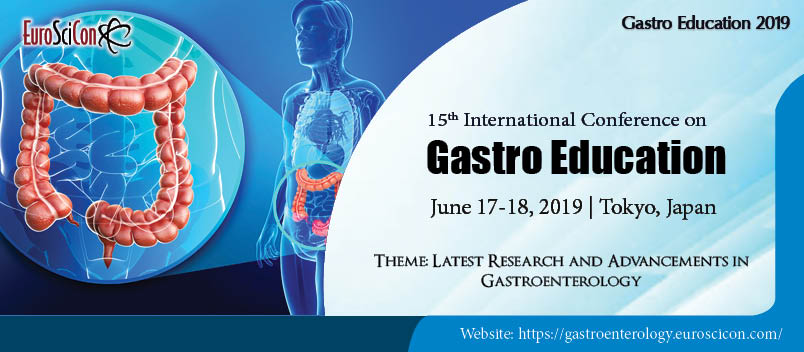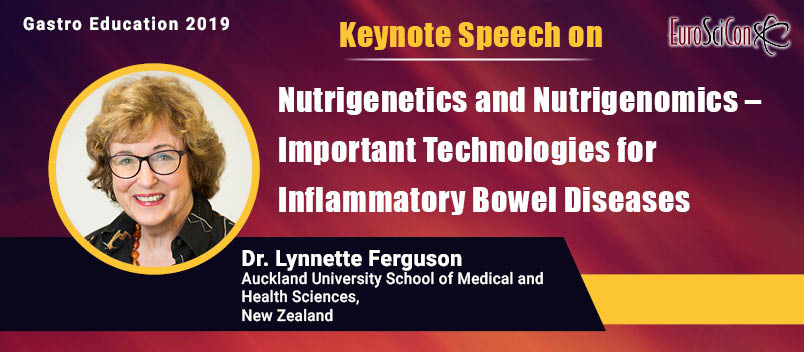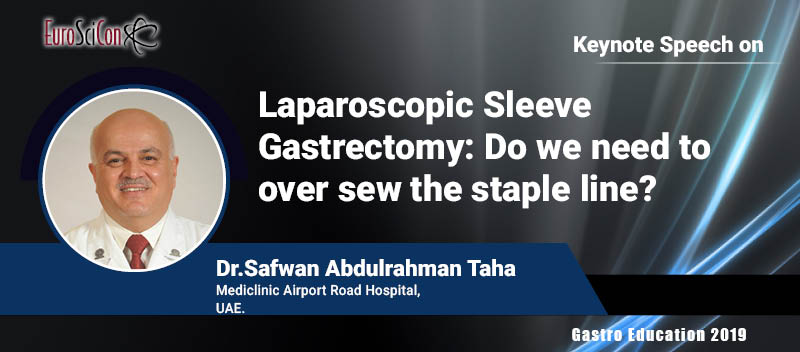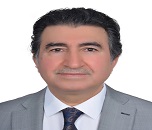Gastro Education 2019
About Conference
EuroSciCon takes the privilege to invite all the participants, speakers, students, delegates, sponsors, exhibitors from all over the world to attend ''15th International Conference on Gastro Education’’, which is to be held on June 17-18, 2019 in Tokyo, Japan.
Gastro Education 2019 will be organized under the theme “Latest Research and Advancements in Gastroenterology’’ which covers a wide range of critically important sessions. This conference deals with the current research developments in the field of Gastroenterology and also about the new treatment methods which are forge by scientists to treat various diseases in an easier way. This conference acts as the best platform for attendees to learn about the recent trends in Gastroenterology research and development.
The conference has been scheduled and implemented in accordance with the accreditation policies and requirements of the Accreditation Committee.
Gastro Education 2019 primarily concentrates on the most recent analytic and restorative methods for gastric maladies. This gastroenterology meeting unites Presidents and Eminent Personalities to investigate openings on developing stages in the field of Gastroenterology. With individuals from around the globe concentrated on finding out about most recent analytic and treatment systems of different gastrointestinal sicknesses and all the related parts of gastrointestinal ailments, this is your best chance to achieve the biggest collection of members from the whole world.
Conference Highlights
- Recent Advances in Gastro Education
- Genetics in Gastroenterology
- Gastrointestinal Disorders
- Gastrointestinal Immunology
- Pediatric Gastroenterology
- Gastrointestinal Surgery
- Gastrointestinal Cancer
- Liver disease & Hepatitis
- Neurogastroenterology
- Endoscopy
- Gastro Vaccines
- Nutrition & Dietetics
- Obesity & Treatments
- Organ Transplantation
Opportunities for Conference Attendees
For Researchers & Faculty:
- Speaker Presentations
- Poster Display
- Symposium hosting
- Workshop organizing
For Universities, Associations & Societies:
- Association Partnering
- Collaboration proposals
- Academic Partnering
- Group Participation
For Students & Research Scholars:
- Poster Competition (Winner will get Best Poster Award)
- Young Researcher Forum (YRF Award to the best presenter)
- Student Attendee
- Group Registrations
For Business Delegates:
- Speaker Presentations
- Symposium hosting
- Book Launch event
- Networking opportunities
- Audience participation
For Companies:
- Exhibitor and Vendor Booths
- Sponsorships opportunities
- Product launch
- Workshop organizing
- Scientific Partnering
- Marketing and Networking with clients
Tracks/Sessions
Track 01: Recent Advances in Gastro Education | Gastro Conferences | Hepatology Conferences | Gastroenterology Conferences | Hepatitis Conferences | Gastroenterology 2019 | Gastroenterology Meetings
The millennium provides an opportunity to contemplate and review the recent past and to plan for the future. The last half century, in particular, has been the golden age of gastroenterology, wherein rigorous, scientifically based medicine has revolutionized gastrointestinal diagnosis and therapy. The technologic fantasy and science fiction of 50 years ago has become the real and commonplace. The peptic ulcer that was treated by the Sippy meal, gastric freezing, or gastric radiation 50 years ago is now treated by scientifically based pharmacotherapy, including potent proton-pump inhibitors and antimicrobial therapy. The awkward, painful, and sometimes dangerous semi-flexible endoscope of 42 years ago has been replaced by the simple, convenient, and safe flexible endoscope.

Genetics and genomics are beginning to strongly influence the care of patients with gastrointestinal conditions. From common disorders such as colorectal cancer, pancreatitis, and multiple polyps; too rare conditions like hereditary haemorrhagic telangiectasia, knowledge of genomic developments is increasingly highly useful to doctors and their patients. Rapid advances in genetics have led to an increased understanding of the genetic determinants of human disease, including many gastrointestinal disorders. Coupled with a proliferation of genetic testing services, this has resulted in a clinical landscape where commercially available genetic tests for gastrointestinal disorders are now widely available.
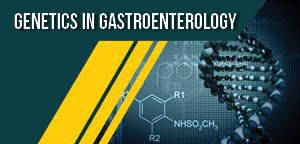
Track 03: Gastrointestinal Disorders | Gastro Conferences | Hepatology Conferences | Gastroenterology Conferences | Hepatitis Conferences | Gastroenterology 2019 | Gastroenterology Meetings
Gastrointestinal disorders include such conditions as constipation, irritable bowel syndrome, haemorrhoids, anal fissures, perianal abscesses, anal fistulas, perianal infections, diverticular diseases, colitis, colon polyps, and cancer. Many of these can be prevented or minimized by maintaining a healthy lifestyle, practicing good bowel habits, and submitting to cancer screening.
Functional disorders are those in which the gastrointestinal tract looks normal but doesn't work properly. They are the most common problems affecting the gastrointestinal tract. Structural disorders are those in which the bowel looks abnormal and doesn't work properly. Sometimes, the structural abnormality needs to be removed surgically. Common examples of structural gastrointestinal disorders include haemorrhoids, diverticular disease, colon polyps, colon cancer, and inflammatory bowel disease.
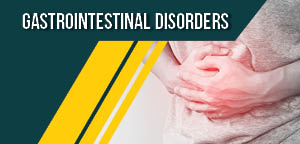
Track 04: Gastrointestinal Immunology | Gastro Conferences | Hepatology Conferences | Gastroenterology Conferences | Hepatitis Conferences | Gastroenterology 2019 | Gastroenterology Meetings
The intestine is the biggest immunology organ in the body. The immune reaction of the gastrointestinal tract to the external stimulus or the failure to respond is an important aspect of the function of the gastrointestinal tract system. Immunology related disorders, like coeliac disease, Crohn’s disease, ulcerative colitis, and food allergy represent an important part of the burden of pediatric gastrointestinal illness. The field of gastrointestinal immunology is continuously expanding and it is important for the pediatric gastroenterologists to improve their knowledge and understanding of the mechanisms causing the diseases they are daily dealing with.
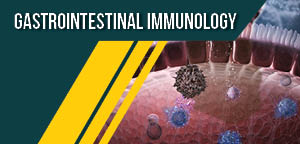
Track 05: Pediatric Gastroenterology | Gastro Conferences | Hepatology Conferences | Gastroenterology Conferences | Hepatitis Conferences | Gastroenterology 2019 | Gastroenterology Meetings
Pediatric Gastroenterology concerned with treating the gastrointestinal tract disorders of infants until age eighteen. Diseases concerned with are acute diarrhea, persistent vomiting, gastritis, and problems with the development of the gastric tract. Pediatric gastroenterology has grown greatly in North America and Europe. A pediatrician can provide treatment to many gastric diseases, but chronic diseases, related to the nutrition of the children, the pancreas or the liver needs to be treated by a specialist.
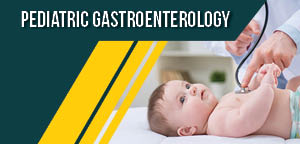
Track 06: Gastrointestinal Surgery | Gastro Conferences | Hepatology Conferences | Gastroenterology Conferences | Hepatitis Conferences | Gastroenterology 2019 | Gastroenterology Meetings
Gastrointestinal surgery is a treatment for diseases of the parts of the body involved in digestion. This includes the esophagus, stomach, small intestine, large intestine, and rectum. It also includes the liver, gallbladder, and pancreas. Surgery may be used to remove a cancerous or noncancerous growth or damaged part of the body, such as the intestine. It may also be used to repair a problem like a hernia. Minor surgical procedures are used to screen and diagnose problems of the digestive system.
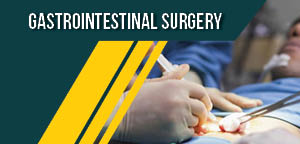
Track 07: Gastrointestinal Cancer | Gastro Conferences | Hepatology Conferences | Gastroenterology Conferences | Hepatitis Conferences | Gastroenterology 2019 | Gastroenterology Meetings
Gastrointestinal cancer refers to the group of cancers that affect the digestive system which includes cancers of the esophagus, gallbladder, liver, pancreas, stomach, small intestine, bowel, and anus. Symptoms of Gastrointestinal cancer related to the organ affected and can cause difficulty in swallowing or defecating, abnormal bleeding or other associated problems. Diagnosis of Gastrointestinal tumors usually requires endoscopy, followed by biopsy of suspicious tissue. Treatment for Gastrointestinal cancer will depend on the type of cancer, the stage or its development, and other health factors. Treatment commonly includes surgery, chemotherapy and radiation therapy. The treatment depends on the location of the tumor, as well as the type of cancer cell and whether it has invaded other tissues or spread elsewhere. Gastrointestinal cancer is the most common form of cancer. More than 24,000 Australians are diagnosed with it each year and 33 Australians die of it each day. Gastrointestinal cancers do not discriminate between men and women.
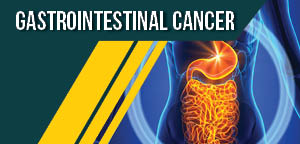
Track 08: Liver disease & hepatitis | Gastro Conferences | Hepatology Conferences | Gastroenterology Conferences | Hepatitis Conferences | Gastroenterology 2019 | Gastroenterology Meetings
Liver disease can be inherited or caused by a variety of factors that damage the liver, such as viruses and alcohol use. More than two billion people have been infected with hepatitis B virus at some point in their life, and approximately 350 million have become persistent carriers. Over two billion individuals have been infected with hepatitis B at some point and around 350 million people are persistent carriers. Hepatitis affects millions of individuals and is associated with several poor outcomes including the liver transplant and liver cancer. Approximately 80% of liver cancers can be attributed to either hepatitis B or hepatitis C virus. With the more widespread implementation of vaccination and strict screening before blood transfusion, lower infection rates are expected in the future.
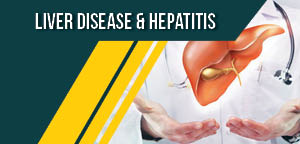
Track 09: Neurogastroenterology | Gastro Conferences | Hepatology Conferences | Gastroenterology Conferences | Hepatitis Conferences | Gastroenterology 2019 | Gastroenterology Meetings
Neuro-gastroenterology mainly focuses on the functions, malfunctions, and the malformations of the sympathetic and parasympathetic divisions of the digestive tract. Neuro-gastroenterology is the study of the gut nerve and muscle physiology and morphology, and its interactions with the nervous system, the brain, hormones, neurotransmitters, pharmacology. Neuro-gastroenterology includes various sub-disciplines that focus on the sensory neurobiology, motor function, gut and brain interactions as well as the understanding and management of gastrointestinal motility and functional gastrointestinal disorders.
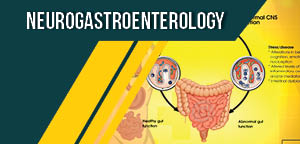
Track 10: Endoscopy | Gastro Conferences | Hepatology Conferences | Gastroenterology Conferences | Hepatitis Conferences | Gastroenterology 2019 | Gastroenterology Meetings
Endoscopy is a procedure that allows a doctor to view the inside of a person's body. Originally, endoscopy was only used in the esophagus, stomach, and colon. Now, doctors use endoscopy to diagnose diseases of the ear, nose, throat, heart, urinary tract, joints, and abdomen. This procedure can be used to investigate unusual symptoms or treat a range of conditions. It can also be performed to carry out a biopsy, where a small tissue sample is taken for further analysis.
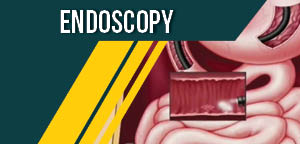
Track 11: Gastro Vaccines | Gastro Conferences | Hepatology Conferences | Gastroenterology Conferences | Hepatitis Conferences | Gastroenterology 2019 | Gastroenterology Meetings
Immunosuppressive agents used to treat inflammatory bowel disease can increase the risk for infections, several of which are preventable through vaccination. The recent study aimed to describe vaccine utilization by immunosuppression status, examine reasons for vaccine refusal, and identify characteristics associated with lack of influenza vaccination in IBD patients. Vaccine utilization remains sub-optimal in IBD patients. Educational interventions may increase vaccination rates by clarifying misconceptions. GIs can play a more active role in health care maintenance in IBD patients by counseling patients on which vaccines to receive or avoid.

Track 12: Nutrition & Dietetics | Gastro Conferences | Hepatology Conferences | Gastroenterology Conferences | Hepatitis Conferences | Gastroenterology 2019 | Gastroenterology Meetings
Nutrition and intestinal function are intimately interrelated. The chief purpose of the gut is to digest and absorb nutrients in order to maintain life. Consequently, a chronic gastrointestinal disease commonly results in malnutrition and increased morbidity and mortality. For example, studies have shown that 50-70% of adult patients with Crohn's disease were weight-depleted and 75% of adolescents growth-retarded. On the other hand, chronic malnutrition impairs digestive and absorptive function because food and nutrients are not only the major trophic factors to the gut but also provide the building blocks for digestive enzymes and absorptive cells. The appropriate diet may have a profound effect on intestinal recovery and successful management of chronic or severe gastrointestinal disease.

Track 13: Obesity & Treatments | Gastro Conferences | Hepatology Conferences | Gastroenterology Conferences | Hepatitis Conferences | Gastroenterology 2019 | Gastroenterology Meetings
Obesity is directly linked to many health problems including cardiovascular disease, type 2 diabetes, fatty liver disease, gallstones, and gastro-oesophageal reflux disease. It is also linked to psychological and psychiatric morbidities. People who are obese are often discouraged because they think they have to lose a lot of weight before any benefits are experienced. This is not true. Any obese person who loses just five to ten percent of their body weight will have significant improvement in health - this would mean between 12-25 pounds for an obese person who weighs 250 pounds. People do lose weight without surgery, however, particularly when they work with a certified health care professional to develop an effective and safe weight-loss program.

Track 14: Organ Transplantation | Gastro Conferences | Hepatology Conferences | Gastroenterology Conferences | Hepatitis Conferences | Gastroenterology 2019 | Gastroenterology Meetings
Organ Transplantation is often the only source of hope for those who suffer from organ failure. Organ transplantation is also a major surgery that carries potential risks and drawbacks, such as the chance of organ rejection. In the United States, 7 types of organ transplants are now performed, according to the United Network for Organ Sharing, a non-profit organization in Richmond Va. UNOS administers the country's only Organ Procurement and Transplantation Network, which includes the organ transplant waiting list.
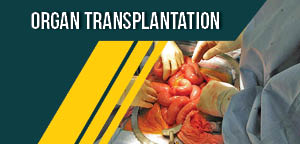
Market Analysis Report
The report predicts the global Gastrointestinal Drugs market to grow with a CAGR between 4.5 % and 5.0 % from 2017 to 2023. The global Gastrointestinal Drugs market was worth USD 46.5 Billion in 2016.
The global gastrointestinal therapeutics market size is expected to reach USD 65.1 billion by 2025, according to a new report by Grand View Research, Inc., registering a 6.6% CAGR during the forecast period. Growing geriatric population prone to gastrointestinal indications is one of the key factors anticipated to contribute to market growth. According to a report by WHO, colon cancer caused nearly 694,000 deaths in 2014.
As per the research report, the global gastrointestinal drugs market is anticipated to be worth US$61.1 billion by 2024. By drug class, acid neutralizers segment not led in the past, but is also expected to remain in the leading position in the coming years.
In terms of geographical regions, the Americas will account for almost 55% of the total market shares by 2020 and will also be the major revenue contributor to the gastrointestinal therapeutics market throughout the forecast period. The rising acceptance of biologics and the introduction of healthcare reforms by various countries in the region will augment the market’s growth prospects in the next four years.
North America held 41% of the market in 2016. Europe has also been witnessing healthy growth and is anticipated to continue being an attractive region for gastrointestinal drugs market. “The emergence of biosimilars for treating inflammatory bowel diseases will also be a key growth driver for the market in Europe. However, Asia Pacific is estimated to be the region with maximum opportunities for growth in the coming years. The growing investments and funding in the field of life science research and advanced therapies for the treatment of gastrointestinal diseases in developing nations such as China and India will fuel the growth of the Asia Pacific market.
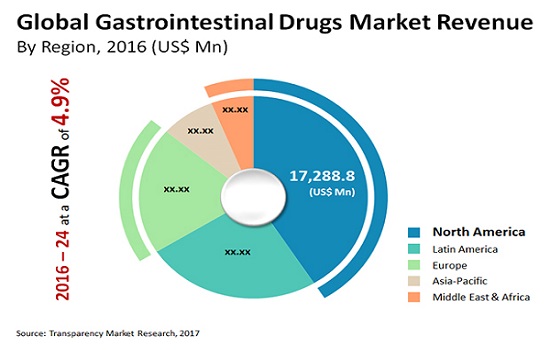
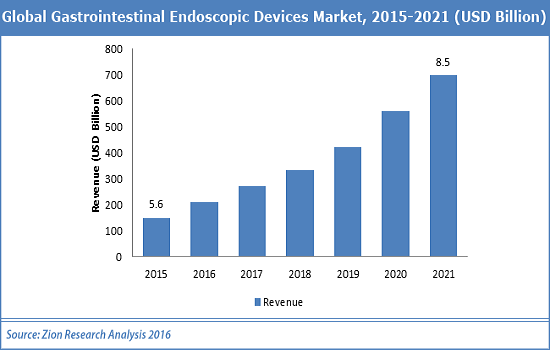
Learn More
Top Gastroenterology Universities
Europe Gastroenterology Universities
Queen Mary University of London | University of Liverpool | University of Hull | University of Nottingham | University of Chester | The Chinese University of Hong Kong | University of Gothenburg | University of Bradford | Autonomous University of Madrid | Catholic University of Valencia | The Autonomous University of Barcelona | Complutense University of Madrid | International University of Catalonia | Miguel Hernandez University | Pompeu Fabra University | Rovira i Virgili University | The Universitat Oberta de Catalunya (UOC) | The University of Barcelona (UB) | Universidad Santiago de Compostela | University CEU San Pablo | University of Alcala | University of Alicante | University of Cadiz | University of Cantabria | University of Castilla-La Mancha | University of Cordoba | University of Extremadura | University of Girona | University of Granada | University of Jaen | University of La Laguna | University of Lleida | University of Malaga | University of Murcia
USA Gastroenterology Universities
Johns Hopkins School of Medicine | Wash U School of Medicine in St. Louis | UC San Diego School of Medicine | UNC School of Medicine | UT Southwestern Medical School | Maryland School of Medicine | Wake Forest University School of Medicine | University of Cincinnati Academic Health Centre | University of Wisconsin School of Medicine | Stony Brook School of Medicine | Vermont College of Medicine | Tufts University School of Medicine | Wayne State School of Medicine | Penn State Hershey College of Medicine | UMASS School of Medicine | Warren Alpert Medical School | Uniformed Services University of the Health Sciences | Rutgers New Jersey Medical School | Oklahoma College of Medicine | San Juan Bautista School of Medicine | Charles R. Drew University of Medicine and Science | University of Virginia Medicine | University of Maryland | University of Alberta | University of Arizona Health Sciences | American College of Gastroenterology
Asia Gastroenterology Universities
Asian Institute of Gastroenterology | Endoscopy Asia | Calcutta School of Tropical Medicine | NUS Executive Education | Roland Duke-NUS Medical School | Ago Medical and Educational Center | Cebu Institute of Medicine | Rawalpindi Medical University | Government Dental College | National University of Singapore | Muhammad Medical College | International University - Cambodia (IU) | University of Health Sciences - Cambodia (UHS-C) | University of Puthisastra (UP) | Akaki Tsereteli State University | David Agmashenebeli University of Georgia | Tbilisi State Medical University | Hashemite University | Jordan University of Science and Technology | Mutah University | University of Jordan | Nanyang Technological University | National University of Singapore | Mordovian Ogarev State University | Moscow Medical Stomatology Institute | Omsk State Medical Academy | Tra Vinh University | Vietnam National University, Hanoi | Vinh Medical University | Aino University
American Gastroenterological Association | Alabama Gastroenterological Society | Phoenix Society of Gastroenterology | San Diego Gastroenterology Society | Southern California Society of Gastroenterology | Florida Gastroenterologic Society | Georgia Gastroenterologic and Endoscopic Society | Louisiana Gastroenterology Society | Maine Gastroenterology Society | Maryland Society for Gastrointestinal Endoscopy | Michigan Gastroenterology Society | Mississippi GI Society | New Jersey Gastroenterology and Endoscopy Society | New York Society for Gastrointestinal Endoscopy | North Carolina Society of Gastroenterology | Ohio Gastroenterology Society | Delaware Valley (PA) Society for Gastroenterological Endoscopy | Pennsylvania Society of Gastroenterology | South Carolina Gastroenterology Association | Tennessee Society of Gastroenterology and Endoscopy | Texas Society for Gastroenterology and Endoscopy | Virginia Gastroenterological Society | Ontario Association of Gastroenterology | American Society for Gastrointestinal Endoscopy | Indian Society of Gastroenterology | The Brazilian Federation of Gastroenterology | Italian Society for Hospital Gastroenterologists and Endoscopists | The Japanese Gastroenterological Association | The Association Mexicana de Gastrotenterologia| Endoscopic Group of the Austrian Society of Gastroenterology | Belgian Society of Gastrointestinal Endoscopy | Association of Gastroenterologists of Bosnia and Herzegovina | Bulgarian Association of Surgeons and Gastroenterologists | Endoscopic Section of Croatian Society of Gastroenterology | Cyprus Society of Gastroenterology | Czech Gastroenterological Society | Danish Society for Gastroenterology and Hepatology (DSGH) | Egyptian Society for the Study of Endoscopy and Hepatogastroenterology | Estonian Society of Gastrointestinal Endoscopy | Finnish Society of Gastroenterology | French Society of Digestive Endoscopy | Endoscopic Section of the German Society of Gastroenterology | Endoscopy Section of the Hellenic Society of Gastroenterology | Endoscopic Section of the Hungarian Society of Gastroenterology | Endoscopic Section of the Iraqi Society of Gastroenterology & Hepatology | Irish Society of Gastroenterology | Israeli Gastroenterology Association | Italian Society of Digestive Endoscopy | Jordanian Society of Gastroenterology & Hepatology | Latvian Association of Gastrointestinal Endoscopy | Lebanese Society of Gastroenterology | Lithuanian Society of Gastrointestinal Endoscopy | Luxembourg Society of Gastroenterology & Digestive Endoscopy | Libyan Society of gastrointestinal endoscopy | Macedonian Society of Gastroenterohepatology | Moroccan Society of Digestive Endoscopy (SMED) | Gastroenterohepatology Association of Montenegro – GAM | Endoscopy Section of the Netherlands Society of Gastroenterology | Norwegian Gastroenterology Society | Palestinian Society of Gastroenterology | Endoscopy Group of the Polish Society of Gastroenterology | Portuguese Society of Digestive Endoscopy | Romanian Society of Gastrointestinal Endoscopy | Russian Society for Digestive Endoscopy | Scandinavian Association of Digestive Endoscopy | Serbian Society of Gastrointestinal Endoscopy | Endoscopy Section of the Slovak Gastroenterological Society | Slovenian Society of Gastrointestinal Endoscopy | Spanish Association of Digestive Endoscopy | Sudanese Society of Gastroenterology | Swedish Society of Gastroenterology | Swiss Society of Gastroenterology | Endoscopy Branch of the Syrian Society of Gastroenterology (SSGE) | Tunisian Society of Gastroenterology & Digestive Endoscopy | Tunisian Society of Gastroenterology & Digestive Endoscopy | Turkish Society of Gastroenterology | Ukrainian Association of Endoscopy | Emirates Gastroenterology and Hepatology Society | Endoscopy Committee of the British Society of Gastroenterology | Yemeni Study Association for Liver, Biliary | GIT Diseases (YSALBG) | World Gastroenterological Organisation | Gastroenterological Society of Australia
Gastroenterology Companies in USA
Boston Scientific | Covidien | EndoChoice | Frontier Healthcare | FUJIFILM Medical Systems | gMed | Olympus | Pentax Medical Company | Physicians Endoscopy | US Endoscopy Group | Biosense Webster | Carl Zeiss Meditech | eLum Technologies| Axcess Surgical | Autocam Medical | Edwards Life Sciences | Endologix | Integra Life Sciences | Lombard Medical | VitalMED | Auris Surgical Robotics | PlenSat | AngioCure | MicroCam | Pelvalon | Mizuho OSI | EndoStim | Coloplast | NorTech Life Sciences
Gastroenterology Companies in Asia & Middle East
GI Dynamics | Coloplast | InCube Labs | Imorgon | Levita Magnetics | Coloplast | MicroPort | Paragon Medical | Lumenis | Biocomposites | MicroPort | Teleflex Medical | GE Healthcare | Toxikon
